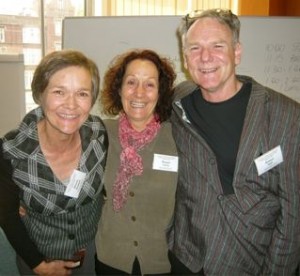 Working on men’s violence against women and children means looking at violence since the beginning of times in all human communities.
Working on men’s violence against women and children means looking at violence since the beginning of times in all human communities.
It means asking how “dangerous stories”, a product of culture, society and identity, manage to recruit new accomplices among young boys, and supporting them in freeing themselves from the shackles of violence. These questions on violence were one of Michael White’s major preoccupations at the end of his life, which he widely shared and developed with the three workshop leaders (in order on the photo: Shona Russell, who is very familiar to us in France, Maggie Carey and Rob Hall), who were very close, long-standing friends and co-workers.
Violence is socially and culturally built , like identity. Men are not the authors of violence, but recruited “soldiers” and accomplices in violent stories. In working with violent men, this externalization allows therapists to deconstruct any temptation to judge on moral grounds or to confront a violent man “with all the evil he has perpetrated” in the hope that he will repent. The difficulty, which has been a subject of debate for many years, is, however, that a violent man cannot accept full responsibility for his acts, unless he becomes aware of his own values, hopes and principles that his acts have shattered. But the path is long to reach this destination
“Face Up” is the name of the program designed by Rob Hall and Alan Jenkins for men who used (and have been used by) violence. The starting point is the initial situation of the therapeutic interview itself, based on questions such as: “Why are we talking about this subject?”, “What is important to you in speaking about what you did?”, “How does the fact that you are starting to face up to what you did contribute to making you the person you want to be?”, “What does the fact that you accept to face up reflect in terms of values in your view of life?”, etc. The objective is to develop an alternative storyline that will place violent acts in perspective and reinterpret them outside of the territory occupied by violence in the individual’s life.
The personal journey is long to reach the stage where the client proposes restitution practices to his victims, that are not selfish manipulations in order to become acceptable again or to take back control, but a real thrust of generosity based on a new ability to “walk in someone else’s shoes”. I will not go into detail here on the various stages of this journey and reveal all the secrets of Rob’s workshop in Paris next week. His associate, Alan Jenkins, has just published a very complete, very “Deleuzian” work: “Becoming ethical, a parallel, political journey with men who have abused” (RHP).
A question remains: how to ensure that “dangerous stories” that underpin violence stay externalized (“spare the rod and spoil the child.”)? By exploring techniques to escape accountability (minimization, excuses, denial, blaming the victim, etc.) with violent men, the practice of power (intimidation, disqualification, etc.) and the ideology that allows this practice of power to develop and justify their acts (“women are the weaker sex”). And by remaining vigilant, as resistance can be used to serve responsibility avoidance techniques to make violence acceptable or at least inevitable as being inherent in the “deepest nature” of maleness.
Other than that, the weather is still great here (see below). Next time, we’ll get together in the summer, in July, for example, for some warmth …
